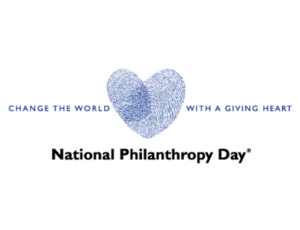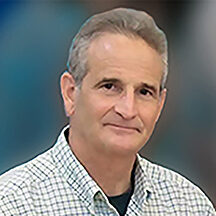November 15th Is Your Day
If you work for a non-profit, volunteer your precious time in various capacities, make gifts choosing not between the good and the bad, but between the good and the good, there is a day with you in mind. National Philanthropy Day (sponsored by the Association of Fundraising Professionals, or AFP) is Tuesday, November 15th. Ever since President Ronald Reagan first signed an official national proclamation in 1986 this has been a special day to recognize all those who contribute precious gifts of time and money to improve the lot of others. Andrea and I enjoy the privilege and pleasure of working with professional and volunteer non-profit heroes virtually every day of the year. They lift our spirits, remind us that more is possible, and validate Abraham Lincoln’s timeless observation of “the better angels of our nature.” We live in a world in which the challenges seem overwhelming — both at home and abroad. But never underestimate the power of good men and women devoted to the noble causes that they know can improve the world. Our new podcast series, Nominate Your Non-Profit North Star, is all about providing much-deserved attention to the millions of people propelling good works forward in boundless different ways. Nominate someone you know — a colleague, friend, neighbor, etc. — whose story merits special recognition and admiration. We want to tell their story as a Non-Profit North Star.
An Icon
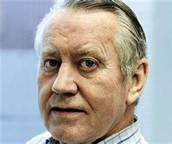
We recently lost Chuck Feeney, who made his fortune as a co-founder of Duty Free Shoppers Group, the travel retailer of luxury products based in Hong Kong. He was the founder of the Atlantic Philanthropies, one of the larger private charitable foundations in the world. Feeney gave away his fortune in secret for many years, choosing to be anonymous, and donating more than $8 billion in his lifetime. He lived incredibly modest, preferring to fly economy and carrying his papers in a plastic bag. A champion of Giving While Living, Feeney long maintained that people of wealth should use it to make the world better during their lifetimes. He decided in 1982 to devote his wealth to the service of humanity, doing it as anonymously as possible. His philanthropy emphasized investing $8 billion+ in promising programs and people and in places where he saw the chance to create opportunity and promote greater fairness and equity for all. Because he believed that it’s imperative to address deeply rooted problems sooner than later, many of the grants were “big bets” designed to bring lasting improvements to people’s lives. His example can and should inspire philanthropists and donors for generations to come.
Giving Tuesday
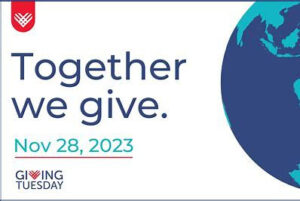
GivingTuesday, this year celebrated on November 28th, is all about saluting each and every single act of generosity we have to offer. Whether it’s making someone smile, helping a neighbor out, or showing up for an issue or people we care about, we each have something to contribute. Identify your gifts, pick a cause that gets you fired up, and give back — not just today but every day. The GivingTuesday Data Commons estimates that giving in the U.S. alone totaled $3.1 billion last year, representing a 15% increase compared to GivingTuesday 2021, and a 25% increase since 2020. From AmPhil (formerly American Philanthropic), here are 10 steps to chart your non-profit’s course to Giving Tuesday success:
1. Set a goal.
2. Determine your audiences.
3. Align your campaign with your core organizational message.
4. Create an integrated marketing plan.
5. Draft your content.
6. Determine sends, posts and campaigns in advance.
7. Install a day-of pop up on your homepage.
8. Provide updates throughout the day on progress toward your goal.
9. After your campaign has ended, create a platform specific to report results.
10. Update your supporters on the impact they made — and Thank Them!
Boost Museums

Walmart heiress and philanthropist Alice Walton is donating grants totaling $40 million to 64 museums throughout the country. The grants range from $56,000 to more than $2 million, and they are intended to help attract first-time museum visitors. The funding will reduce admission costs and fund programming, marketing, outreach and additional efforts that reduce barriers to access. Walton’s gift is through the Bentonville non-profit Art Bridges Foundation, her endeavor to expand access to American art. Art Bridges chose recipients by looking at their annual operating expenses and admission costs and will make the funds available over the next three years beginning in January 2024. Many museums have struggled to regain their pre-pandemic attendance figures, with a recent survey from the American Alliance of Museums finding that visitor numbers are still down about 30% at two-thirds of museums since 2019. Walton, the only daughter of Walmart founders Sam and Helen Walton, is the founder of Crystal Bridges Museum of American Art in Bentonville. It opened in November 2011 and has welcomed approximately 11 million visitors, with no admission cost.
Advancing Opportunities in Haiti

At the Clinton Global Initiative 2023 Meeting, the W.K. Kellogg Foundation announced a $30 million, three-year Commitment to Action to invest in local efforts to advance opportunities for Haitian children, families and communities. Several other funders — including the Digicel Foundation, Dunn Family Charitable Foundation, and Porticus — also made commitments totaling another $20 million collectively. The commitments are part of Pockets of Hope, a new $90 million campaign created by the Kellogg Foundation and partners to catalyze philanthropic support for community-led education, health, economic security and other game-changing initiatives in Haiti. There has been a significant decline in philanthropic support for Haiti in recent years at a time when the need has dramatically increased. Pockets of Hope encourages partners across the philanthropic sector and beyond to make a collective commitment to support local communities and organizations working to chart a new course for the future of their country.
Televised Webcast

Thanks to TVSA, the City of San Antonio’s public access channel, we will be broadcasting our first televised webcast as part of our non-profit empowerment series and the commitment to test new formats. Frank W. Burns, Jr., Television Programming Coordinator, City of San Antonio, has been especially valuable in guiding us to a smooth transition. This being the season, we are excited about addressing the topic Holiday Parties on All Budgets. Joining us as our subject matter expert is Dona Liston, owner of Lambermont Events. This will be the 5th time she serves as our esteemed authority at either a live workshop or webinar. We don’t know anyone who has more wisdom, experience and personal insights to share on how to provide your guests with a good time, regardless of the size of the gathering, budget or venue. Her expertise will enable your non-profit to put smiles on faces and get the most bang for a buck. The webcast will run Wednesday, December 6th, 4 PM to 5 PM Central time. Watch for your invitation. Because it is being pre-recorded there will be no virtual audience interaction.
What Happens After "No"

It’s much more fun to hear that you are being funded, but, Lori Guidry, Educational Programming Manager, Candid, reminds us that a grant proposal rejection letter presents opportunity, too. It’s a chance to develop a relationship with grant-makers, find other prospective funders, and refine your proposal writing skills. She highlights three key questions to ask after you’ve found out you’re not getting the grant. These can help you determine how you can do better the next time.
1. “Do you think I should apply again?” — This can help you understand where to best spend your finite time and energy.
2. “Was there something I did wrong in my proposal?” — Posing this question can be an opportunity to further refine your proposal writing skills.
3. “Do you have any suggestions for where else I might apply?” — Funders network with each other and are usually well acquainted with others in their area.
On the subject of what works and what doesn’t in winning grants, be sure to register for our October 25th, 4 PM to 5 PM, Central time webinar led by Diva, Alex Dunn, Millionaire Grant Lady.
Need More Time

Another challenge after being turned down is the donor prospect requesting more time. Invariably all fundraisers are going to hear this response from their donors, especially when asking for major gifts. As in all other phases of fundraising, you need to be prepared on how to respond. It doesn’t mean that the doors are closing; to the contrary, it can mean more opportunities for more impactful gifts. We are grateful to Bloomerang for featuring our article on meeting this timely challenge.
Now Streaming
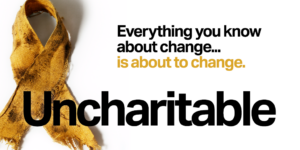
After three of the most dynamic and successful U.S. charities were shut down by conservative charity watchdogs, destroying lives and cutting off precious resources, many of the top influencers in the field knew something had to be done to overhaul the non-profit sector. Dan Pallotta, who presented a record-breaking TED Talk on the subject, led philanthropists and changemakers to produce a feature-length documentary directed by Stephen Gyllenhaal that exposes the dark side of philanthropy and introduces a radical new way of giving. In a powerful call to action, Uncharitable demands that charities be freed from the traditional sackcloth-and-ashes constraints, so that they can truly change the world. Driven by the poignant, personal stories of Dan Pallotta, Steve Nardizzi, Dorri McWhorter, Scott Harrison, Edward Norton, Darren Walker and other prominent figures in philanthropy, Uncharitable delivers an emotional journey that moves, persuades and inspires its audience to change the way we think about giving. No topic is more crucial and timely as we confront an increasingly unstable world with the growing revelation that we are all interconnected and that our fate lies in how much we are willing to invest in positive change.
Bookshelf: Fundraising for Introverts
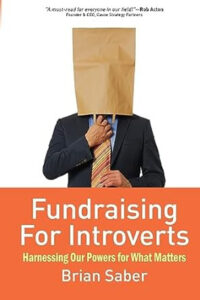
In Fundraising for Introverts, author Brian Saber — a good friend who has led several of our webinars and will do so again — challenges the stereotype that fundraisers must be extroverted by highlighting the unique qualities and strengths that introverted fundraisers bring to the table. Drawing on his extensive experience in fundraising and research on the topic, Saber aims to dispel misunderstandings and provide clarity on a topic that is close to his heart. A self-proclaimed introvert, Brian’s latest book acknowledges the need to leverage the skills of introverted fundraisers who may feel their natural tendencies conflict with the perceived requirements of the profession. His book also caters to managers and leaders who oversee introverted fundraisers, offering insights on how to harness and leverage their exceptional qualities. Saber emphasizes that introverted fundraisers possess an incredible range of innate qualities that can greatly contribute to their fundraising success. Some of these qualities often include:
- Active Listening
- Thoughtfulness and Reflection
- Empathy and Authenticity
- Preparation and Research
- One-on-One Relationship Building
Watch for your webinar invitation as Brian provides an in-depth look at his new book on Wednesday, November 29th, 4 PM to 5 PM, Central time.
501(c)(3) vs. 501(c)(4)

The IRS requires 501(c)(3) organizations be created for religious, charitable, scientific, and educational purposes. 501(c)(4) organizations are social welfare groups. This is the primary difference between the two, but there are many more. For a deeper dive, from our friends at Donorbox … A 501(c)(3) non-profit organization is typically created for religious, charitable, educational, scientific, and/or educational intent. They are tax-exempt, conduct research, and are limited to an amount of lobbying, advocacy, or political activity. Donations to 501(c)(3) organizations are tax-deductible. Churches, cancer research and support groups, women’s shelters, and mentoring programs for at-risk youth are examples of 501(c)(3) groups. A 501(c)(4) is a “social welfare group” that can advocate for causes and propositions like a 501(c)(3). However, 501(c)(4)s can also endorse specific candidates — one of the most substantial differences between the two. Examples of this status include political action groups to advance reproductive or civil rights. While non-profit organizations with this status are also tax-exempt, donations to 501(c)(4) groups are not tax-deductible.
Quiz: Turkey States
It’s not just for Thanksgiving anymore. Turkey consumption has nearly doubled since 1970 (8.2 pounds per capita), as consumer education and awareness of the nutritional value and taste of turkey products continue to increase. For instance, ground turkey has seen a significant increase in popularity as a nutrient-rich, lower fat substitute for ground beef. In 2021, U.S. consumption of turkey was 5.1 billion pounds and 15.3 pounds per capita. Where are turkeys produced? Match the following states with their respective production of birds (in millions).
1. Ind. a. 6.9
2. Minn. b. 14.5
3. N.C. c. 20.5
4. Penn. d. 30
5. Va. e. 40.5
Stratagems is published monthly by Jim Eskin, Founder of Eskin Fundraising Training, LLC. We offer workshops and customized training sessions for board members, staff and volunteers of non-profit organizations of all kinds and sizes. For details about our services and information, or to find out how to schedule a training session for your organization, visit our website. Follow our events on Facebook, and read more articles about philanthropy on our LinkedIn page.
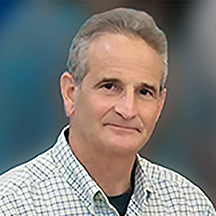
Jim Eskin, Founder
Eskin Fundraising Training
Email: [email protected]
Cell: 210.415.3748
www.eskinfundraisingtraining.com
ANSWERS TO THIS MONTH’S QUIZ: 1=c, 2=e 3=d, 4=a, 5=b |

